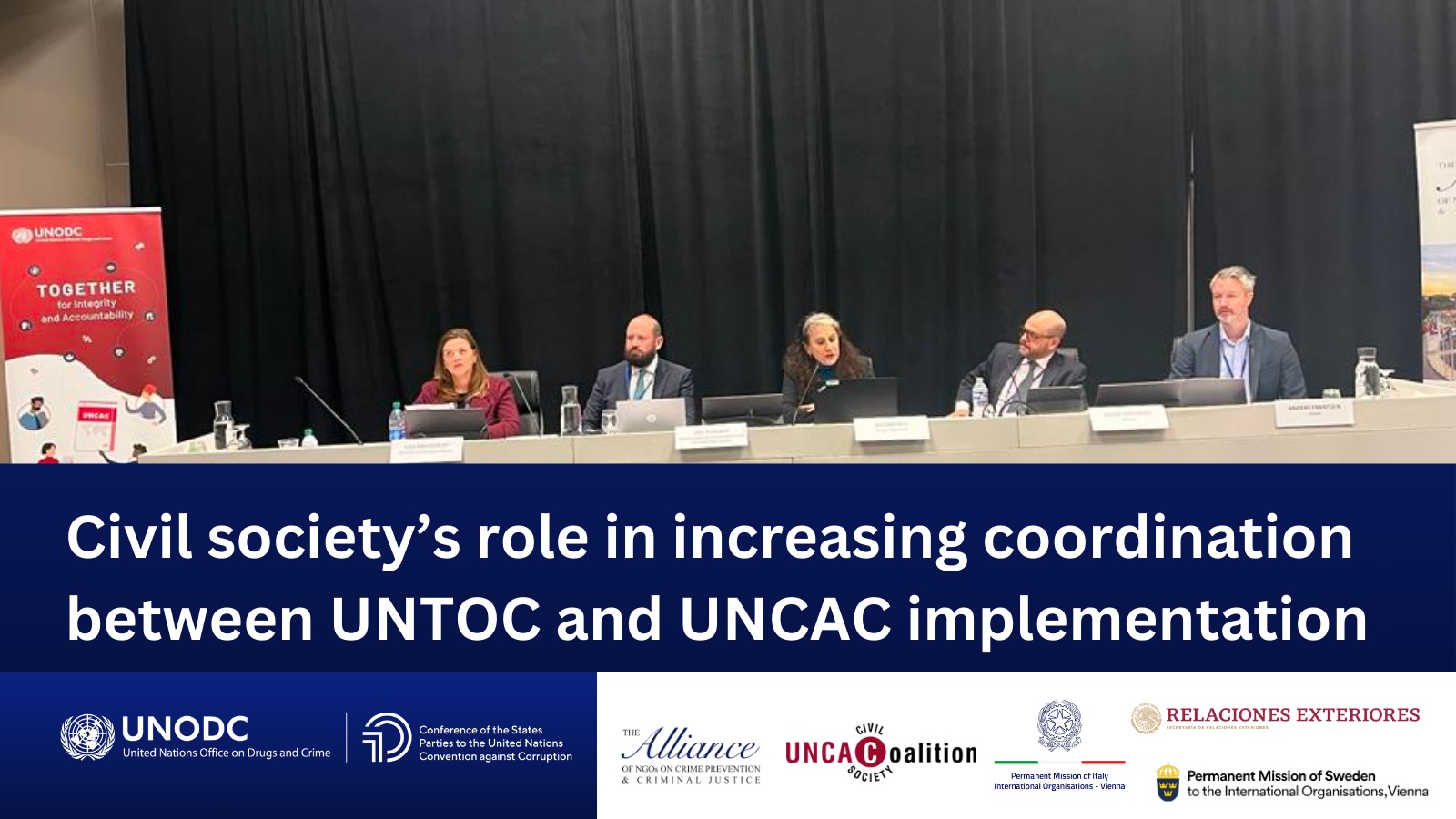
Atlanta, USA – 14 December 2023. The connections between corruption and organized crime are complex and varied. Corruption serves as a primary facilitator of organized crime, with proceeds from illicit activities further sustaining corrupt practices. At the same time, the United Nations Convention against Transnational Organized Crime (UNTOC) and the United Nations Convention against Corruption (UNCAC) have many overlaps and linkages, as do their Conferences of Parties and review processes.
To address these issues and the increasing role of civil society organizations in coordinating implementation of the UNTOC and UNCAC, the UN Office on Drugs and Crime’s (UNODC) Civil Society Unit (CSU) in collaboration with the Alliance of NGOs on Crime Prevention and Criminal Justice, and the UNCAC Coalition organized a special event during the tenth session of the Conference of the States Parties (COSP) to UNCAC in Atlanta, USA. The hybrid event was co-sponsored by Italy, Mexico and Sweden and attended by over 70 participants.
The event moderated by Anders Frantzen of UNODC highlighted the potential for civil society organizations to enhance coordination in addressing shared challenges and achieving mutual objectives.
In his opening remarks, Diego Simancas, Deputy Permanent Representative of Mexico to UNODC, underscored the significance of this side event to the COSP. Mr. Simancas commented that the widening gap between the UNTOC and UNCAC has been a historical mistake. Stark separation of these conventions has limited global capacities and national responses by limiting the tools available or many nations. Referring to the tabled resolution by Italy and Mexico, he underscored that the main goal is to bridge the gap between UNTOC and UNCAC by providing more tools and stronger frameworks to dismantle corruption and organized criminal networks. As such, he emphasized the linkage between corruption and organized crime, the need to follow the money flows and stressed promoting a ‘culture of transparency.’
The Chair of the UNCAC Coalition, Gillian Dell, stressed that coordination between UNCAC and UNTOC is essential for more effective global and national anti-corruption efforts. She emphasized that "Corruption and organized crime are increasingly interlinked, and there are common challenges in tackling them. Moreover, cross-border organized corruption is itself a form of transnational organized crime, where the main illicit activity is the corruption.”
Ian Tennant, the Chair of the Alliance of NGOs said that it has been a “mistake for the two conventions to have been allowed to grow apart over the years, but it is a scandal that civil society access has been so restricted. The interlinked threats of organized crime and corruption can only be addressed effectively with inclusive engagement between states and civil society,” - stated Mr. Tennant.
Lisa Hartevelt of the Wildlife Justice Commission, representing Working Groups in both the UNCAC Coalition and the Alliance of NGOs, discussed the way corruption drives environmental crime and the plundering of nature. Ms. Hartevelt underscored the connection between illegal activities such as mining, logging, and wildlife trafficking to criminal networks that exploit corruption. She warned that such corruption harms biodiversity, leading to species extinction and hindering climate and development goals.
The event delved into a resolution on the policy level coordination that is needed, as it discussed how civil society and umbrella organizations can be a link and a bridge between the different treaty bodies. Notably, a COSP10 resolution tabled by Italy and Mexico is acknowledging and aims to tackling the relationship between corruption and organized crime for the first time.
In this special event, participants had the opportunity to highlight and deliberate on the intricate links between corruption and organized crime across local, regional, and global contexts. Discussions centred on effective strategies to address these interconnected phenomena through the UNCAC COSP and other relevant multilateral approaches.
In conclusion, the event highlighted the multistakeholder database and knowledge hub, WhatsOn, which provides a range of tools and resources for a variety of stakeholders to access information. It also serves as a platform for registration, connection, and networking with other counterparts.